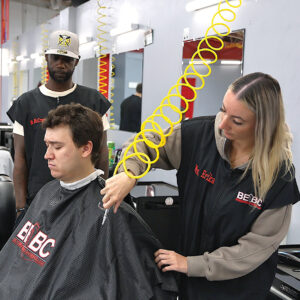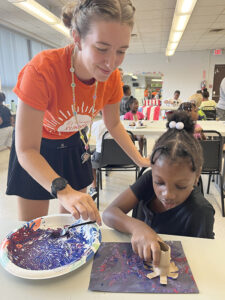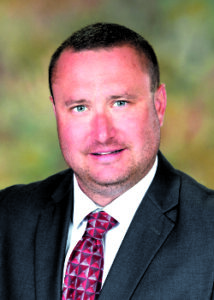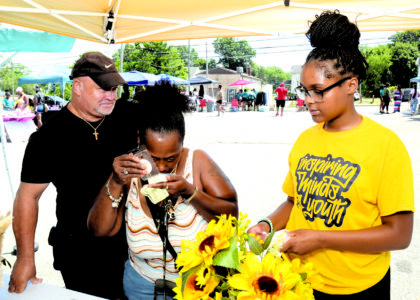Understanding developmental disabilities one haircut at a time

Correspondent photo / John Patrick Gatta Beyond Expectations Barber School student Robert McCrae of Youngstown, left, supervises as Erika Mike of Boardman uses an air hose to blow off cut hair from Evan Papadopoulos during the Cutting Barriers: Inclusion Day event at the school with Gateways to Better Living residents.
YOUNGSTOWN — The students at Beyond Expectations Barber College (BEBC) gained valuable knowledge this week that there’s more to styling hair than merely acquiring skills using scissors and electric clippers.
Learning how to interact with all types of people, including those with developmental disabilities, can make a visit more of an overall satisfying experience.
“Haircuts are more than a routine,” said Kristie Murphy, Community Engagement Director of Gateways to Better Living. “They’re an opportunity for connection and confidence.”
Gateways has locations in Boardman, Youngstown and Niles, and serves those with developmental disabilities in Mahoning and Trumbull counties.
“Half the battle is wanting to work with our population. Then, just a little learning under your belt, a little bit of understanding, that’s what a lot of people are missing. Once you have the desire to work with our population, they’re a great group, and it really could be lucrative for the barbers as well as beneficial for our folks because they have a better understanding of how to relate to them,” Murphy said.
A partnership between Gateways and Beyond Expectations resulted in the first “Cutting Barriers: Inclusion Day” event Thursday at the barbershop school’s Glenwood Avenue location on Youngstown’s South Side.
The 10 students who participated gave free clipper cuts to more than 30 adult men served by Gateways. Many of them live in its residential programs and receive day services.
“They are excited,” said Beyond Expectations manager Eryca Garrett. “It’s an amazing opportunity for our students to experience all aspects of being a barber. Additionally, these individuals deserve quality grooming services, and we are proud to be able to provide that to them.”
An integral part of the Mahoning Valley for over 50 years, Gateways to Better Living — through advocacy, inclusion and opportunities for personal growth — provides support services that enhance the lives of young adults to seniors who have developmental disabilities, according to its website.
“The idea (of Cutting Barriers) stemmed from recognizing that many of the individuals we serve either avoid haircuts due to past negative experiences or lack access to stylists trained to accommodate their needs. We wanted to create a positive, inclusive haircutting experience that could break down those barriers,” Murphy said.
“After connecting with Eric Garrett Sr. and the team at BEBC, especially Eryca Garrett, its manager, we realized we shared a common goal, to uplift the community and promote inclusion. From there, the collaboration quickly came to life.”
Founded and owned by retired Army veteran Eric D. Garrett Sr., Beyond Expectations Barber College has been open for 14 years and has graduated more than 300 students. It offers comprehensive training for future barbers incorporating technical skills with affordable haircuts for the community in order to prepare students to serve diverse populations with excellence and professionalism.
Murphy explained that the haircutting approach to those with DD was based on years of hands-on experience supporting Gateways’ residents. Working at the non-profit organization over the past 23 years, she has watched how collaborations between its staff and local professionals can bring about positive results.
“We combined evidence-based strategies with our own real-world insights to tailor the training for a barbershop environment,” she said.
To make sure that students at BEBC were prepared in ways that were practical and meaningful, Murphy led an interactive training session at the school two days before the event.
“It was a comprehensive, interactive session designed to help barbers understand and effectively serve individuals with developmental and intellectual disabilities,” she said.
During the training, the students learned communication procedures such as speaking slowly, offering visual cues, allowing time for responses as well as emphasizing the value of involving the client in decisions, asking permission and respecting personal space.
“They were really engaged and asked a bunch of questions,” she said. “So, they have the desire.”
Since they were going to use electric clippers, they were made aware of how to manage reactions to loud volumes and bright lights.
“Many individuals with developmental disabilities, especially autism, are sensitive to sound and vibration,” Murphy said.
The barbers were taught to demonstrate the clippers first — even on themselves — to reduce fear, offer alternatives such as using scissors and checking if the noise is too loud for the client.
They also learned de-escalation techniques such as staying calm and understanding behavior as communication.
“We start by normalizing that it’s okay not to have all the answers. What matters most is being kind, patient and open to learning,” Murphy said.
While caregivers were present, the students were taught to always engage the client directly.
The training with Murphy was meant to encourage barbers to view DD clients not as different, but as people who may need a slightly different approach.
“Hands-on activities also helped students experience what some disabilities might feel like,” said Murphy, “such as communicating nonverbally or processing distractions, giving them insight into the client’s perspective.
“We emphasize that barbers already have the skills. They just need to apply them with sensitivity and flexibility. This training ensured that both the barber and the individual feel prepared, respected, and successful. It’s about building trust, creating comfort, and celebrating dignity.”
“You never know who will sit in your chair as a barber,” Eric Garrett said. “No matter who the person is, always operate with professionalism and treat them with respect.”




